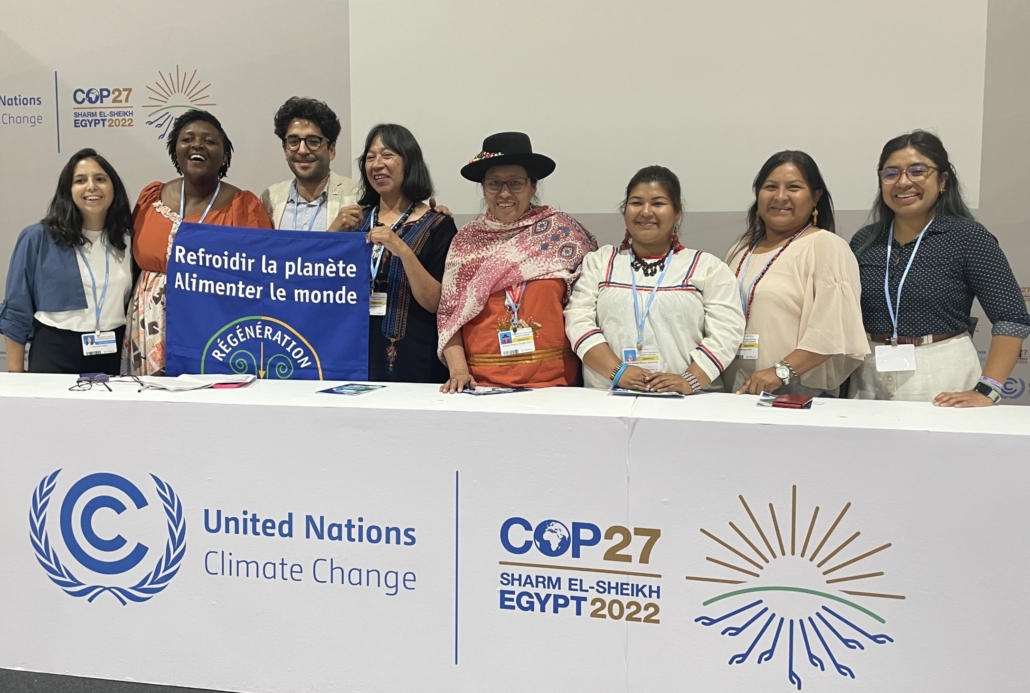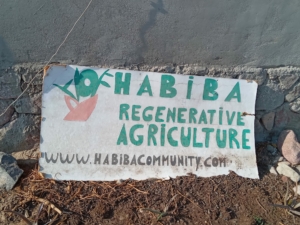Women Voices from Global South Discussing Food Sovereignty and Climate Change at COP 27
During COP 27, a group of women from Abya Yala(1) raised their firm and deep voices to speak up about food sovereignty in regions that are so different and yet alike as America and Africa. The talk was organized by Regeneration International and OMANIAP.
At the Green area of the climate summit in the Tutankhamun auditory, the powerful female voices pondered about the impact of climate change in the lives of women and their communities, the consequences for food sovereignty and the importance of ancestral science and knowledge, demanding public policies to guarantee their rights, territories, water, biodiversity, seeds and preserve their traditional foods.
Mercedes López, Vía Organica’s Director in Mexico City started the discussion in the panel speaking about the need for communities to choose the concept of food sovereignty over food security (used by FAO). Food sovereignty is more comprehensive and prioritizes food, ancestral seeds, territories, and water for the people. It is the people who have the option to choose healthy, local and nutritious food and the right to protect themselves from poor quality agricultural imports foreign to their traditional diet. López insisted on the importance of the participation of communities in agricultural policy; prioritizing and acknowledging farmers’ voices.
Food security, on the other hand, implies access to sufficient food regardless of its origin, processing and use of agrochemicals and/or transgenic seeds, all this without respect or consideration to food culture and pertinence.
She called out the fact that Coca-Cola and Nestle where sponsors of COP 27. Companies that have favoured industrial agriculture, warming of the planet and cause of obesity and malnutrition; in addition to polluting the planet with their plastic containers and using water reserves.
Precious Phiri, Regeneration International’s African Coordinator, pointed out that climate change is strongly impacting women from the Global South, and made the point that the term climate change does not seem to her strong enough and it would be better to talk of climate emergency, with economic and social consequences.
She mentioned that it is important to go beyond food security, under which groups of donors are pushing communities to have access to any type of food, just like the green revolution model pushed by Big Ag, without taking care of diversity and specificity of nutrition amongst different communities.
This represents a big challenge for farmer communities that are pressured to adopt a model that places them in insecure situations and the answer ends up being worse than the problem. She concluded her participation commenting that climate emergency is creating a very serious economic, environmental, and social situation and it affects more women, who have the challenge to feed their families.
Wilma Mendoza, President of the National Confederation of Indigenous Women from Bolivia (CNAMIB, by its Spanish Initials) mentioned how indigenous women are fighting to keep their identity, seeds, and territories in the face of GMOs and industrial agriculture.
She explained that in Bolivia food sovereignty and security topics are included within the Development Plan, but monocrops are still supported.
Mendoza mentioned that women are more aware about the need to eat their own foods with no agrochemicals or GMOs , and are the seed keepers. It is women-she went on- , who are more affected by droughts, flooding, frosts, plagues and deforestation.
On her turn, Mayra Macedo, Secretary of the National Organization of Andean and Amazona Indigenous Women of Peru (ONAMIAP) mentioned that public policies and food programs in Peru are insufficient and promote monocrops such as oil palm and papaya, invading their Amazonian lands, destroying the rainforest and polluting it.
Macedo said that there are two social central food programs: school breakfast which is deficient because it includes high processed foods and beverages, that only benefit the economy of companies that sell these products and not the communities and promoting raising backyard animals such as guinea pigs which cannot survive in the Amazonian region because they live in cold climates like the Andes. She criticized the lack of vision and knowledge in both programs.
She went on making a call for women to become involved in policy making, specifically in social programs designed to bring back food sovereignty.
The last speaker was Melania Canales Poma, Leader of the Quechua People and Coordinator of the Continental Network of Indigenous Women from America (ECMIA-South Region) who said that indigenous women demand guarantees and respect to their collective territories. She mentioned as an example that in Peru, 49% of the territory is in the hands of farmer and native communities, but the land is being invaded and they are being dispossessed in various legal ways.
She went on wondering how food sovereignty would be possible if women are being deprived of their land and pointed out the importance of reviewing the legal status of the territories. It is indigeneous woman, after all, who have raised their voices against GMOs and defended ancestral knowledges.It is indigeneous women who have demanded rights, opposed machismo, extractivism and dispossession.
The talk ended with comments and questions from the audience, summing up the importance of preserving indigenous practices, knowledge and science from the ancestors; to resist transculturation of nutrition and colonialist customs acquired through migration; demanding recognition and visibility of women’s inputs with fair payments; organization in biocultural spaces; as well as preserving ancestral traditions such as rainwater capture to face the scarcity that is prevailing around the world.
Even though it was a small space in the middle of a vast array of side events, conferences and high level debates, this group of women showed that they are organizing, fighting and proposing new alternatives every day to defend biodiversity, seeds, territory and women’s dignity in different communities all over the world.
1 Abya Yala in Kuna language (Colombia and Panama) means earth, life, territory, flourishing land. “Abia” means “hole of blood”, “mature mother”, “mature virgin”, “land in its full ripeness”. The term is used to name the territory between the American Continent.


